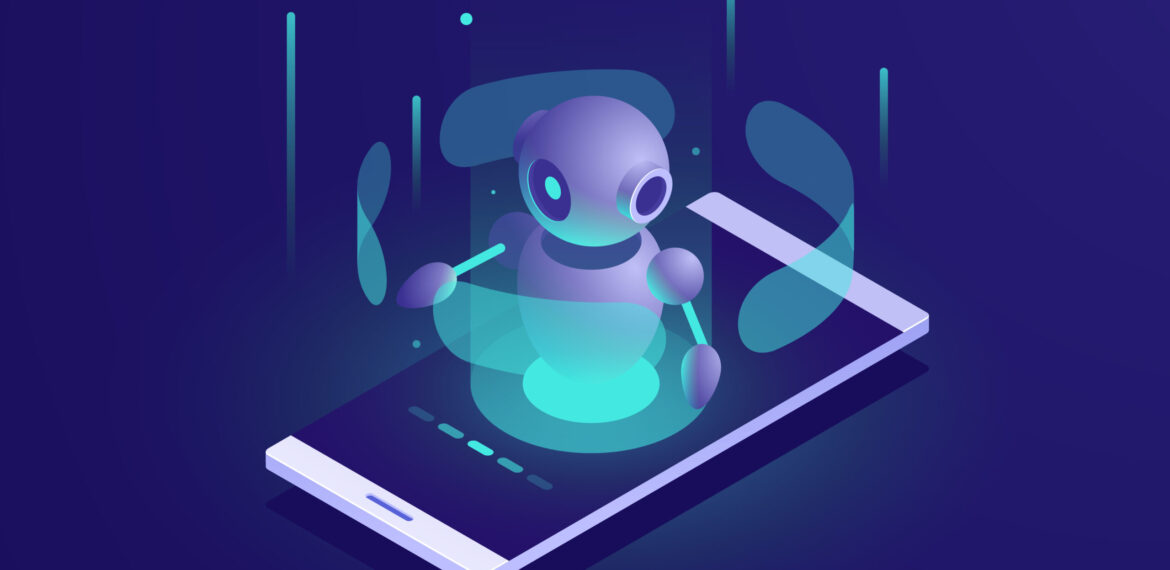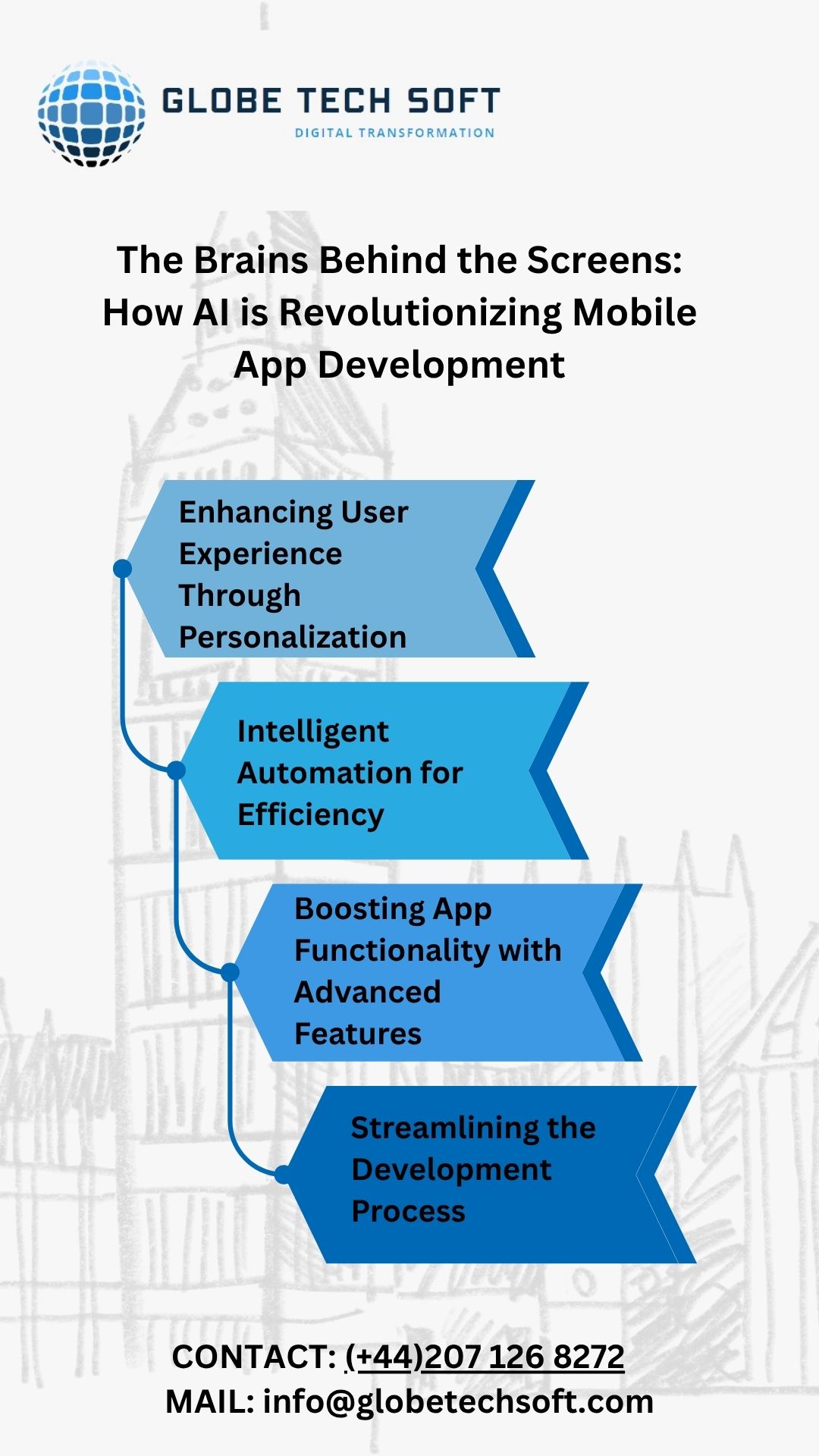
The Brains Behind the Screens: How AI is Revolutionizing Mobile App Development
The Brains Behind the Screens: How AI is Revolutionizing Mobile App Development
In today’s fast-paced digital world, mobile apps are more than just tools; they’re integral to our daily lives. From managing our finances to keeping us entertained, apps are constantly evolving to meet our diverse needs. And at the heart of this evolution lies Artificial Intelligence (AI), transforming not just what apps can do, but how they are built.
AI is no longer a futuristic concept; it’s a present-day reality profoundly impacting mobile app development services. It’s making apps smarter, more intuitive, and highly personalized, pushing the boundaries of user experience and operational efficiency. Let’s dive into the key roles AI plays in shaping the mobile app landscape:
1. Enhancing User Experience Through Personalization
One of AI’s most significant contributions is its ability to deliver hyper-personalized experiences. AI algorithms analyze vast amounts of user data – browsing history, preferences, in-app behavior, location, and more – to offer tailored content, recommendations, and notifications.
- Personalized Recommendations: Think Netflix suggesting your next binge-watch, Spotify curating playlists based on your mood, or e-commerce apps showing products you’re likely to buy. AI is the engine behind these intelligent suggestions, leading to increased engagement and satisfaction.
- Adaptive UI/UX: AI can dynamically adjust the app’s interface and features based on individual user behavior. This means layouts, color schemes, and even feature visibility can change to optimize the user journey, making the app feel uniquely designed for each person.
- Contextual Awareness: Apps powered by AI can understand context, including your location, the time, and your typical habits, to offer truly relevant assistance or information.
2. Intelligent Automation for Efficiency
AI streamlines various aspects of mobile app development and functionality, automating tasks that were once time-consuming and manual.
- Chatbots and Virtual Assistants: AI-powered chatbots provide instant, 24/7 customer support, answering queries, resolving issues, and even completing transactions within the app. Virtual assistants like Siri and Google Assistant are prime examples of AI driving conversational interfaces, enhancing accessibility and user convenience.
- Automated Testing and Debugging: AI tools can automatically detect bugs, suggest fixes, and perform continuous regression tests, significantly reducing development time and ensuring a more reliable application. This allows developers to focus on more complex tasks and innovation.
- Code Generation and Optimization: Generative AI is beginning to assist developers by generating code snippets or even entire functions based on descriptions, accelerating the development process and potentially reducing manual coding errors.

3. Boosting App Functionality with Advanced Features
AI empowers mobile apps with sophisticated capabilities that were previously unimaginable.
- Image and Object Recognition: From identifying products in e-commerce apps to recognizing faces for security or applying filters in social media, AI’s computer vision capabilities open up a world of interactive possibilities.
- Voice Recognition and NLP: Natural Language Processing (NLP) enables apps to understand and respond to human language, whether spoken or typed. This fuels voice commands, real-time language translation, and intelligent search functionalities.
- Predictive Analytics: By analyzing historical data, AI can predict user actions, anticipate needs, and forecast trends. This is invaluable for businesses to make data-driven decisions, from optimizing inventory to proactively addressing potential user churn.
- Enhanced Security: AI plays a crucial role in strengthening app security through biometric authentication (facial recognition, fingerprint scanning), fraud detection by identifying unusual patterns, and anomaly detection to protect sensitive user data.
4. Streamlining the Development Process
Beyond user-facing features, AI is also transforming how mobile apps are built:
- Data Analysis and Insights: AI-driven analytics offer developers and businesses in-depth insights into user behavior, app performance, and market trends, informing strategic decisions and future enhancements.
- DevOps and Performance Tuning: AI can optimize server loads, predict traffic spikes, and automate deployment schedules, leading to reduced downtime and improved scalability.
The Future is AI-Powered
As AI technologies continue to advance, we can expect even more sophisticated integration into mobile app development. The future promises hyper-personalized experiences, seamless integration with IoT devices, more intuitive conversational interfaces, and even greater automation throughout the app lifecycle.
For businesses looking to stay competitive, embracing AI in their mobile app development strategy is no longer an option, but a necessity. It’s about building smarter, more engaging, and efficient applications that truly understand and cater to the individual needs of their users. The brains behind the screens are getting smarter, and our mobile experiences are all the better for it.


